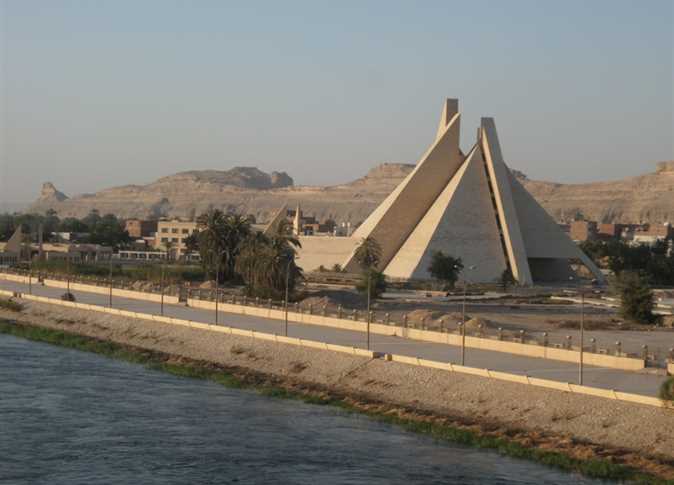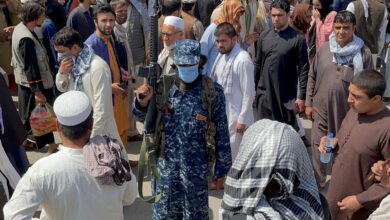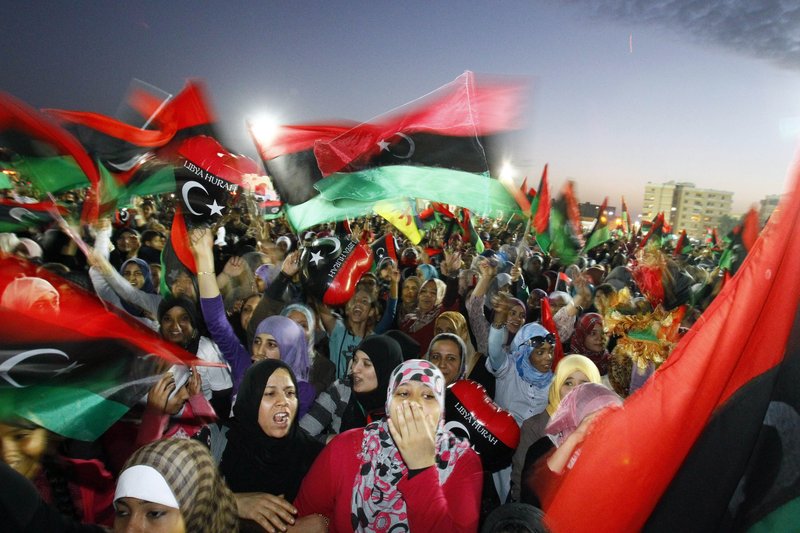
2011 has been eventful, inspiring, and sometimes depressing. The following critics’ picks try to capture the conflicting emotions of the year.
Graffiti: The SCAF versus the will of Egypt
By Jano Charbel
Street artist Hosni spray-painted this graffiti on Downtown’s Mugamma building, during the 8 July sit-in. The graffiti was later painted over.
Books: ‘Vertigo’ speaks the truth
By M. Lynx Qualey
Ahmed Mourad’s “Vertigo” was originally published by Dar Merit in 2007 to relatively small acclaim. In 2011, the novel raised its profile: An English edition appeared in October, and in December, producers announced plans to turn “Vertigo” into a Ramadan series that’s set to air next summer.
Mourad’s “Vertigo” didn’t predict a revolution, as is said of Mohamed Salmawy’s “Wings of the Butterfly” (2011). Its artistic merits may be overshadowed by newer novels like Youssef Rakha’s “Book of the Sultan’s Seal” (2011). But what “Vertigo” captures that is so essentially 2011 is the desire to rock our corrupt, and degraded world by — somehow — speaking the truth.
The protagonist, named Ahmed (like the author), is a simple Egyptian guy who works as a photographer to the powerful (as the author once did). Over the course of the novel, the fictional Ahmed comes across evidence of murder and rank corruption amongst Egypt’s elites. He suffers many humiliations at their hands and wants somehow to bring his evidence to light.
Ahmed (the fictional one) tries publishing his photographic evidence in newspapers. This doesn’t work, because the newspapers are too yellow: sensationalist, corrupt, and cowardly. Indeed, the newspaper editors are also found among the corrupt and cliquish elite.
Ahmed’s path is dangerous, and once the book finally settles on its twin paths of romance and intrigue, his adventure makes a quick and enjoyable read. Some of the characters — such as the chaste, beautiful beloved, and the chubby, laughable best friend — are a bit flat. But “Vertigo” is funny and raw. And most importantly, for 2011, is the book’s attempt to chronicle political and economic corruption. Like the spirit of this year, this is truly brave.
Film: ‘Al-Haram Street’ and the public craze
By Ramy Abdel Razek
“A film’s success depends much on the social and intellectual environments that surround its production,” says film critic Samy al-Salamony. “There are no technical determinants of a movie’s success, but rather moments of movie-watching frenzy that make people decide to watch one movie and not the other, based on what they are experiencing.”
Perhaps there’s no better example than the film, “Al-Haram Street,” to prove Salamony right.
What happened when “Al-Haram Street” was screened during the Eid al-Fitr holiday last summer can only be described as “frenzy.” For months, movie theaters had been closed and revenues at the box office were minimal, mostly because of the ongoing revolution. But when the film opened in theaters, it generated LE10 million in five days. Still, “Al-Haram Street’s” technical merits do not exist.
The supposedly comedic film can easily be described as superficial, mediocre and even immoral — the storyline is based on a girl being raped by a sadistic man, only to find her father trying to make some money off her misfortune by pressuring her to work as a belly dancer at a nightclub on Haram Street.
Defending his “film,” producer Ahmed al-Sobky argues that the public needs to enjoy a light film with “dancing, music and punch lines” to relieve the stress of the times they are living through.
Some might believe that such moments of hankering are merely the result of people being overwhelmed by political events. But in reality, they reflect the absence of well-informed filmmakers, producers, and even critics.
Many filmmakers have turned into political theorists instead of being inspired by the current changes to develop artistically mature content. Hence, the stage was left for “Al-Haram Street” to become the cinematic experiment that represents the industry in 2011. The cure for the aforementioned frenzy is not more singing and belly dancing movies, but rather a collective stance on the part of all film enthusiasts who believe in cinema as a tool no less important than any revolutionary action, partisan slogan, or protest.
Art: Much remains to be told
By Mai Elwakil
In 1967, at the outbreak of the Arab-Israeli War, 14 international cargo ships got stuck in the Suez Canal. The crew were trapped on board until 1975, while numerous maritime species continued their waves of migration under water from the Red Sea to the Mediterranean, ones they had started in 1869 when water first started flowing through the opening into the tidal strait.
But like the Red Sea fish that found a new home in the less salty and nutrient rich eastern Mediterranean, the Yellow Fleet crews (that became their name, as the ships were covered with the desert sand over the years) adapted to their new life. They issued their own collection of stamps, declaring the Great Bitter Lake their territory; and in 1968, they even held a Ships Olympics in parallel to the Olympics held in Mexico City, during which the Mexican police and military cracked down on student protesters who criticized the government’s heavy spending on Olympic facilities at the expense of social programs.
History is intertwined, or in fact “up for grabs,” as the Swiss artist Uriel Orlow, who tells both stories through his work, wrote in a statement. He tells the first story in “Lessepsian Migrants,” a selection of intricate drawings exhibited at the Alexandria Contemporary Art Forum as part of the exhibition “There’s nothing left.” Two hundred kilometers to the south, Cairo’s Contemporary Image Collective hosts the story of the Yellow Fleet unpacked through Urlow’s installation “The Short and the Long of it 7.0.”
The 1968 Olympics inspired those on the ships, as did the student protests in different ways, just as the Arab Spring is said to have inspired movements in Europe and the US. So, although 2011 is almost over, the story definitely is not. New narratives and stories will continue to surface, showing the complexity of events and bringing back the masses to side with the revolution. The horrific accounts, statements and media coverage that we’ve been waking up to every morning all feed into that, exposing as much as they conceal. It’s only a matter of time and effort to listen to and tell the stories on a metro ride, on the street or at a local coffee shop.
Music: Ahmed Spider, I love you
By Ali Abdel Mohsen
For someone who started off life as a jar of hair gel, Ahmed Spider has done well for himself. I’m ashamed to say I was aware of his existence long before the revolution, when I stumbled onto his website and went through his “songs” with a mixture of fascination and sheer terror. I forced my fiancée to listen to “Valentine’s Day” until she threatened me with violence. I asked my boss if I could write about him and she gave me a look that said, “How do you still work here?”
Now, it seems the tables have turned, and Spider and I are enjoying the last laugh — although his sounds more like a weasel with a cold. In unstable, schizophrenic, post-revolutionary Egypt, Spider has evolved into a political commentator, taken seriously by people desperate for someone to take seriously. To them, Spider appeared to fit the bill. He’s young, so by default he’s “in the know” when it comes to Facebook-y stuff like the revolution, and he’s clearly consumed by a concern for his nation. His speech is rushed, his logic circular, and he’s mostly incoherent — things that should surely serve as insurmountable obstacles for any political analyst, not to mention singer, but not Spider.
People were listening to him, so much that he recently felt the need to announce his “resignation” from all political activity, which isn’t an indication of his delusion as much as it is of the desperation of many who saw fit to pay attention to him in the first place.
If it wasn’t for Spider, we might have never known that the revolution was carefully plotted by Freemasons, or that everyone in Tahrir was, in fact, a dirty foreigner and probably secretly Jewish. And if it wasn’t for the likes of Spider, those pro-Mubarak rallies could have been entirely humorless, which would have been almost impossible to handle.
Spider is an embodiment of the corrupt politics, public naiveté, and cultural desolation that make up much of modern day Egypt. While that may sound crushingly depressing, he considerately balances it out by being a singer who, pronounces “Valentine” with a “b”.
So, for me, there can only really be one choice for this category. Spider may not be the best or worst singer of 2011, mainly because he’s not a singer by any stretch of the imagination, but he definitely represents the insanity and surrealism of this past year.




